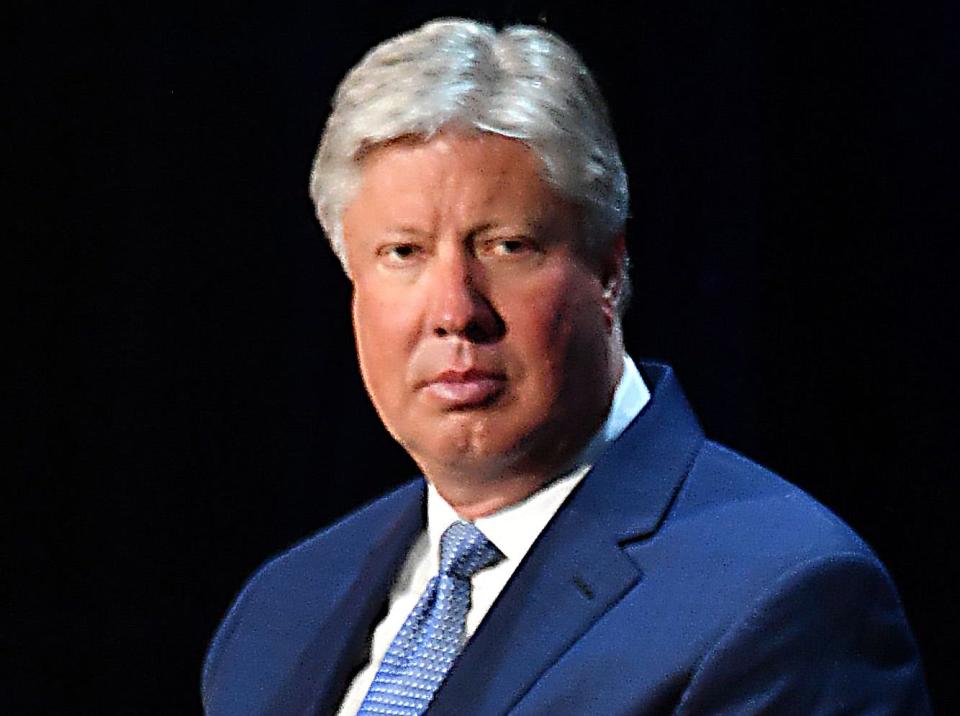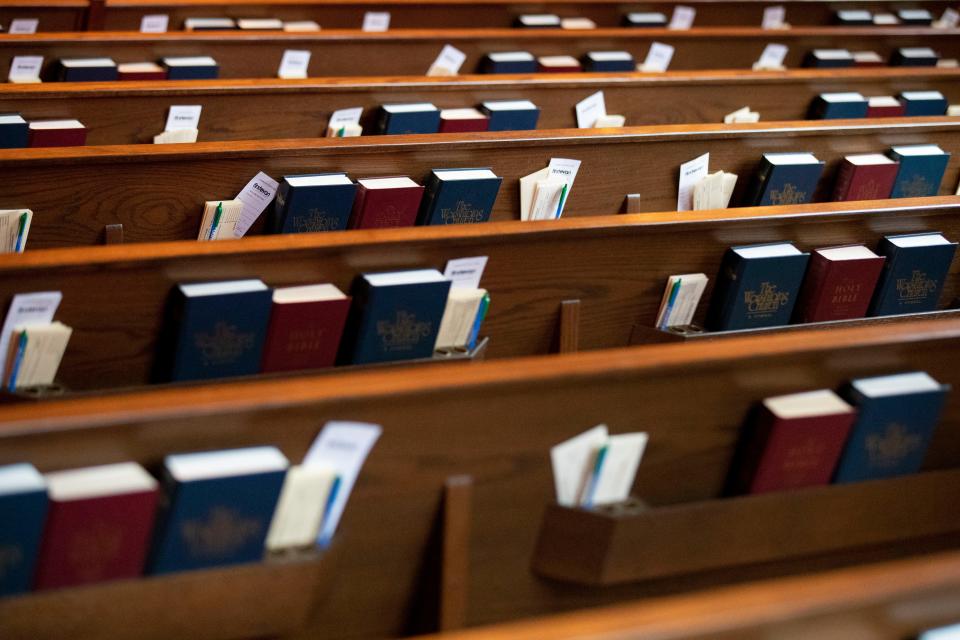Evangelicals need to focus on church's sexual abuse epidemic, not just Trump or drag queens
An epidemic of sexual abuse involving evangelical church leaders is hurting victims across the country. Even worse, churches far too often have covered up the abuse.
While the evangelical church is not a monolith and all churches should not be blamed for the failures of some, there is a pattern of abuse in a number of churches going back years, even decades.
I'm an evangelical who has attended evangelical churches my whole life. Before evangelical leaders say a word about the upcoming election, abortion policy or drag queens, they must look at why and how this is happening ? for the sake of victims and for the health of the church.
Robert Morris steps down amid abuse allegations

The most recent example involves Robert Morris, the head pastor at Dallas-based Gateway Church, one of the largest congregations in the country. Morris, who stepped down Tuesday amid abuse allegations, admitted to "inappropriate sexual behavior with a young lady" that occurred decades ago.
Cindy Clemishire told a website that exposes sexual abuse in churches that she was 12 years old and Morris was 21 when the pastor began to sexually molest her. Clemishire, who is now 54, says the abuse went on for almost five years.
Two weeks ago, Gateway's board of elders sent a memo to church staff, which was later posted to X, saying that Morris had been “open and forthright about a moral failure he had over 35 years ago.”
However, in a statement released Tuesday, the elders backtracked, saying that "we regret that we did not have the information that we now have." Morris, a past spiritual adviser to former President Donald Trump, resigned from his position with the church that same day.
Evangelicals love Trump: Trump's questionable morality gets a pass from evangelical voters. I decided to ask why.
Abuse and cover-ups are rampant in evangelical churches
Morris is just one example in a litany of similar behavior that is all too pervasive in evangelical churches. Evangelicals make up about 25% of the U.S. population and include Baptists, Lutherans and members of other Protestant denominations.
Some of the larger evangelical congregations are nondenominational, meaning they operate outside the authority and accountability of a larger organization.
And while it's not fair to tarnish all churches because of the crimes of one megachurch pastor, there is a clear pattern of abusive and at times criminal behavior among pastors and other leaders in a growing list of evangelical congregations.

In February, Aaron Ivey, a worship pastor at Austin Stone Community Church, an evangelical congregation in Austin, Texas, was fired over explicit text messages sent to at least one underage male. The church’s leadership in a statement said that Ivey engaged in “predatory manipulation, sexual exploitation, and abuse of influence” with adult males and a minor male.
In May, a victim spoke out, saying he was 15 when Ivey groomed and then molested him. Ivey, with his wife, had co-authored a book on marriage.
In 2018, several women accused Bill Hybels, former lead pastor of Willow Creek Community Church near Chicago, of sexually harassing them. The megachurch has seen its once 25,000 weekly attendance drop to under 18,000, according to ChurchLeaders.com.
"The Rise and Fall of Mars Hill" podcast details the bullying, verbally abusive behavior of then-pastor Mark Driscoll, whose church boasted nearly 15,000 attendees at its height. He is now a pastor at a church in Scottsdale, Arizona.
 | Sign up for our Opinion newsletter on conservative values, family and religion from columnist Nicole Russell. Get it delievered to your inbox. |
Then there is the long-term abuse that occurred in the Southern Baptist Convention, the second-largest faith group in the United States. The SBC says about 47,000 churches are associated with its denomination, with about 13 million members.
In 2019, the Houston Chronicleand the San Antonio Express-Newspublished an investigation that found an epidemic of SBC leaders committing and covering up sexual abuse. In 2022, a third-party report by Guidepost Solutions found that SBC leaders ignored or stonewalled abuse survivors while simultaneously keeping a list of accused abusers, 703 at the time.
According to the Guidepost report, “For almost two decades, survivors of abuse and other concerned Southern Baptists have been contacting the (SBC’s leadership committee) to report child molesters and other abusers who were in the pulpit or employed as church staff. They made phone calls, mailed letters, sent emails, appeared at SBC and (leadership) meetings, held rallies, and contacted the press…only to be met, time and time again, with resistance, stonewalling, and even outright hostility."
When will evangelical churches take accountability?
Fewer than 1 in 3 sexual assaults are reported in the United States. Child sexual abuse also is vastly underreported, according to the National Center for Victims of Crime. So it's reasonable to conclude that abuse is happening in our churches far more often than we know.
Abuse within a faith setting is particularly heinous. People flock to an evangelical church for a variety of reasons, including needing support as they go through a hard time, desiring emotional or spiritual healing or at the invitation of friends or family. They trust that the evangelical church community, including pastors and other leaders, are kind, trustworthy and respectful, just like the Jesus Christ the church claims to follow.
Abuse, especially sex abuse of children, destroys that inherent trust. And as the Catholic Church has experienced, abuse at the hands of a trusted faith leader is incredibly damaging ? emotionally, mentally and spiritually.
Like the abuse that occurs in a variety of settings ? whether at work, in an intimate partner relationship or with a trusted pastor ? it is not an issue of whether or not a woman (or man) "asked for it," "consented" or was in the wrong place at the wrong time. Sexual abuse is not a relationship problem, it is an abuser problem. It is not random, or based on "passion"; it is often calculated, occurs through purposeful grooming and requires significant manipulation and deceit. It stems from gross power dynamics and the abuser's belief that he is entitled.
It is particularly heinous that leaders of evangelical churches are vocal about abortion policy, elections and the LGBTQ+ community even as their congregations struggle with abuse. How can evangelical churches condemn drag queens when some of those churches have been led by pastors who sexually abused children?
Surgeon, whistleblower, felon? A surgeon outed a Texas hospital for treating trans kids. Now he faces federal charges.
This kind of hypocrisy, among other reasons, contributes to why so many younger people have walked away from or refuse to join faith communities.
No human being is sinless. Everyone struggles at times to do the right thing. Neither Jesus Christ nor the Christian faith demands perfection or a sinless life. That would be impossible. Forgiveness and restoration is a tenet of Christianity and Christ's message to the world.
But the sexual abuse of children is a crime and should permanently disqualify a person from leading a church. It's that simple. When will evangelical churches stop covering up for their leaders and do right by their victims?
Nicole Russell is an opinion columnist with USA TODAY. She lives in Texas with her four kids. Sign up for her newsletter, The Right Track, and get it delivered to your inbox.
You can read diverse opinions from our USA TODAY columnists and other writers on the Opinion front page, on X, formerly Twitter, @usatodayopinion and in our Opinion newsletter.
This article originally appeared on USA TODAY: How common is sex abuse in church? Evangelicals need to face the truth
